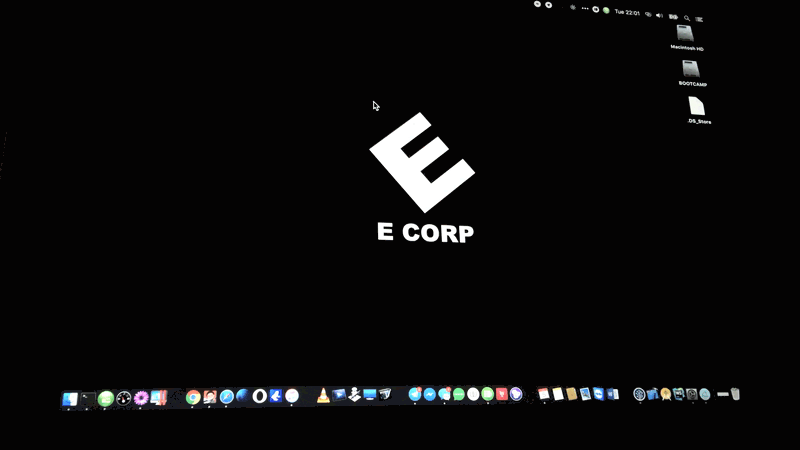Animated Wallpaper featuring a glitched E-Corp company logo,
Known as Evil Corp from Mr. Robot.

Not affiliated with USA Network, Anonymous Content, Universal Cable Productions or NBC Universal Television Distribution.
[whoismrrobot.com](https://www.whoismrrobot.com)
Download the latest version of E-Corp Live Wallpaper on the Releases page.
npm install --global live-wallpaper-ecorp # Installs the node CLI module
live-wallpaper-ecorp # Runs itClone the repo and install dependencies.
git clone https://github.com/sidneys/live-wallpaper-ecorp.git live-wallpaper-ecorp
cd live-wallpaper-ecorp
npm installRun the app with integrated Electron.
npm run start
npm run start:dev # with Debugging Tools
npm run start:livereload # with Debugging Tools and LivereloadInstall the app in the System app folder and start it.
npm run localsetup
npm run localsetup:rebuild # Build before installation
npm run localsetup:rebuild:dev # Build before installation, use Developer ToolsBuild the app and create installers (see requirements).
npm run build # build all available platforms
npm run build macos windows # build specific platforms (macos/linux/windows)- Building for Windows requires
wineandmono(on macOS, Linux) - Building for Linux requires
fakerootanddpkg(on macOS, Windows) - Only macOS can build for other platforms.
Install Homebrew, then run:
brew install wine mono fakeroot dpkgsudo apt-get install wine mono fakeroot dpkgTurnkey build-in-the-cloud for Windows 10, macOS and Linux.
The process is managed by a custom layer of node scripts and Electron-optimized configuration templates. Completed Installation packages are deployed to GitHub Releases. Builds for all platforms and architectures take about 5 minutes. Backed by the open-source-friendly guys at Travis and AppVeyor and running electron-packager under the hood.
- Fork the repo
- Generate your GitHub Personal Access Token using "repo" as scope. Copy it to the clipboard.
- macOS + Linux
- Sign in to Travis using GitHub.
- Open your Travis Profile, click "Sync Account" and wait for the process to complete.
- Find this repository in the list, enable it and click "⚙" to open its settings.
- Create a new Environment Variable named GITHUB_TOKEN. Paste your Token from step 2 as value.
- Windows
- Sign in to AppVeyor using GitHub.
- Click on "New Project", select "GitHub", look up this repo in the list and click "Add".
- After import navigate to the Settings > Environment subsection
- Select "Add Variable", insert GITHUB_TOKEN for name, paste your Token as value. Save.
-
Add a new Tag to start the build process:
git tag -a v1.0.1 git push --tags
The builds are started in parallel and added to the "Releases" page of the GitHub repo (in draft mode).
-
Use the editing feature to publish the new app version.
-
There is no step 3
At time of print, wallpaper apps - which are in essence Desktop applications claiming a special UI layer between the icon- and wallpaper space - are not readily implementable using the Electron framework, due to current limitations of the BrowserWindow API with regards to the Windows platform.
If this status quo changes, so will this application.
- Gitter Developer Chat
- Issues File, track and discuss features and issues
- Wiki Read or contribute to the project Wiki
sidneys 2017






